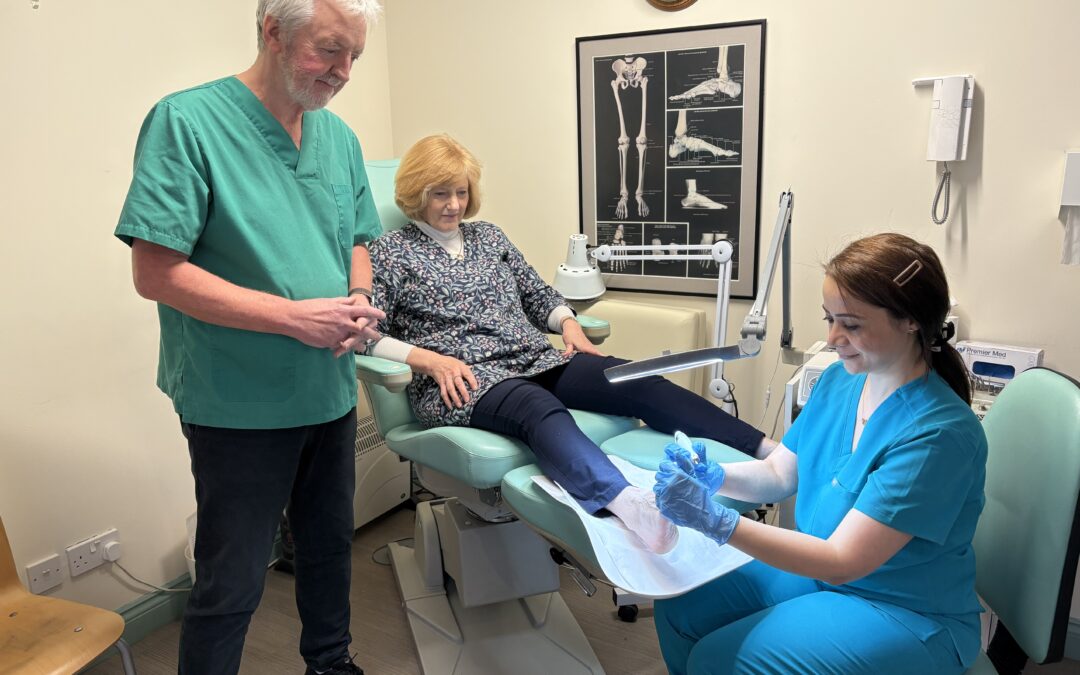Podiatry can be a highly fulfilling occupation, offering a degree of working hours flexibility that is unheard of in most other medical professions. Yet the day-to-day experience of practicing and the financial reward for ostensibly delivering the same treatments can vary dramatically from one HCPC registered footcare professional to another.

During a typical day, c50% of a podiatrist’s waking hours are spent at work. This is a significant amount of time – especially when you realise that time spent in clinic represents the lion’s share of your ‘peak’ time – with much of the rest of the day bookended by waking up, getting ready, commuting and then winding down towards sleep.
If you are unhappy in your day-to-day work, then the frustrations will inevitably spill over and tarnish the non-working areas of your life. This fact holds true irrespective of whether you work for the NHS, are employed in private practice, or own your own business.
This resource has been written to provide UK podiatry professionals like you with a degree of context and balance that may be difficult to find elsewhere.
The resource has 2 main objectives:
1. To help podiatry professionals who are not happy in their work to objectively examine the reasons behind this. In doing this we hope to encourage them to take proactive steps to tackle the areas of dissatisfaction identified, rather than continuing to suffer in silence.
2. To ensure that medical footcare professionals review ALL the facts about their current position carefully and do NOT fall into the trap of automatically assuming the grass is greener elsewhere when a recruitment consultant gets in touch looking to make a fast buck.
Typical Podiatry Human Resources Pain Points
There are numerous factors that can have a detrimental impact on your enjoyment of your work.

National politics, NHS culture and rationing
The massive problems within the NHS are well documented:
• NHS budget cuts are leading to a rationing of both physical and medical/human resources in many departments.
• We have a rapidly ageing population, presenting with ever more complex medical needs, ramping up the demand for foot care.
This potent combination is making smooth delivery of service extremely challenging for most front-line NHS podiatry clinics.
Extrapolating the trend lines – so much is going to be demanded of so few. Inevitably this will lead to longer waiting times, patient dissatisfaction, worse overall patient outcomes – and more stress and pressure on NHS podiatry staff.

Isolation – Whilst there is ample opportunity to interact with patients during treatments – compared with many other healthcare disciplines, chiropodists can sometimes feel like a very isolated field in terms of interactions with colleagues. The specifics of the customer journey and clinic set up in your workplace have a major impact in this area – either reinforcing a sense of isolation or promoting more positive professional interaction and collaboration.
Physical Working Environment – we have already established that around 50% of your waking hours (on a workday) are spent at your place of employment. This means that your working environment is important. Lack of natural light, noise pollution, restricted space, damp, poor equipment and décor can all have a negative impact on your sense of wellbeing, or even your mental and physical health.

- Few would claim that the feet are a glamorous part of the human anatomy. During my consultancy work, numerous highly qualified podiatrists have confided in me that some of their patients “look down on them” and do not hold them in the same esteem as other medical professions. In my experience, this patient perception and podiatrist experience is – to a large extent – dictated by a company’s pricing and market positioning. In other words, higher prices and a premium working environment, combined with more specialist equipment and services tend to lead to a greater level of respect and appreciation of a podiatrist’s medical expertise by patients.
Finally, there is of course, the small matter of……….

Remuneration – with a head count of around 1.3 million, the NHS is Europe’s largest employer. Of the nearly 13,000 registered podiatrists in the UK, around 22% work exclusively for the NHS, 33% work within both NHS and private settings and the remaining 41% work exclusively in the private sector or in education or research.
Pay and conditions contrast greatly between NHS and private work. On one hand, employee pay within the NHS is governed by ridged pay bands, and high workloads; but the flip side of this is that they benefit from clearly defined career enhancement pathways.
In contrast pay within private practice is market driven, with some business owners earning six figures per annum – whilst in many cases not even having to work full time. The downside being that private podiatry practice tends to have less structure, HR support and tends to lack clearly defined career progression pathways for employees (other than them eventually becoming partners in or outright owners of their own private podiatry business.)
It is important to note that numerous historic studies on the wider topic of job satisfaction across all sectors and industries have shown that pay is NOT the key factor in terms of job satisfaction. However, with recent, sustained high inflation and the associated cost-of-living crisis – pay is becoming increasingly important to sustain any reasonable quality of lifestyle.
Looking At Your Specific Situation
Whilst your profession as a podiatrist is a means to an end, it is a cornerstone of your life – and your experience of life – so it should be so much more.
Take a moment to consider your level of job satisfaction in your current role.
What is right for you, is unique to you.
If you find yourself going through the motions and don’t currently love what you’re doing enough to want to be the best at it, it is time to get out, or at least formulate a plan for change. Your current working life is not a rehearsal for something else!
No matter how good you are at your role, sometimes you must be proactive and circumnavigate the current limitations. Sometimes you have to make a change – or at least take a very serious look at the current status quo of your situation.

Is it time for a change?
The table below has been created to help you to reflect on your current situation, to review the options and ascertain what your next move should be.
It is critical to be completely honest about where any career dissatisfaction is coming from.
|
Question |
Suggested Next Step |
| Is it the nature of the job?
Could it be that you have truly and irreversibly fallen out of love with it and that podiatry is now the wrong career choice for you?
|
A complete change of career at any age is a major life-changing event. Most footcare professionals have bills to pay and dependents to support. A complete change of career is likely to involve studying to achieve new qualifications and time to acquire experience in the new field, before you can expect to command anything like you currently earn.
If this is the right thing for you to do, then it is going to take hard work and short-medium term sacrifice, but it is eminently achievable if approached pragmatically and in a structured way. For resources to help explore this further go to www.rockstarretirement.com
|
| Is it the nature of the business/practicing environment that you work in that is the problem?
|
If you love your patient-facing clinic work, but feel underappreciated or under-rewarded by your employer, then it is time for a change. Depending on where the problem lies, it may be time to have an honest face to face conversation with your boss. It may be possible to renegotiate your terms of employment and/or deployment.
If it is genuinely a cultural/political problem, then it is time to find a new job. Further details of how to approach this can be found in this resource, following this table. |
| Are you the problem?
Few of us like to admit it, but sometimes the blame lies much closer to home. Could your lack of satisfaction – at least partly – be down to your own mental attitude and approach to work? |
Sometimes it is easier to blame circumstances and everyone else, when a large part of your dissatisfaction at work may lie firmly on your own shoulders. In life, even the most successful professionals can’t operate 100% in all areas, all of the time. Life is not always a bed of roses and sometimes we can fall below the high standards we set for ourselves. Before making any major career-changing decisions, make sure that your own house is in good order. Set yourself a target to review your own performance and attitude for the next month. If you are genuinely giving it everything and are being positive and proactive and still feel unhappy then and only then is it time for a change. Further ideas on how to get yourself back into peak performance can be found at www.rockstarretirement.com |
How to approach the search for a new podiatry job
Whilst a change is as good as a rest, you don’t want to jump ship from one set of employer’s shortcomings straight into another sub-optimal working environment.

A key to fast-tracking the right opportunity is to identify the right company and the right boss. You should aim to work within a culture that respects high-calibre people and one that’s pay structure reflects performance.
In this type of company, you become a key player, a person of significance to the management – rather than just another number.
For the purists and the brave, one way to truly avoid politics and to live or die by your results is to go it alone by either purchasing an existing podiatry business or starting your own.
Click here to view our current portfolio of podiatry businesses for sale
For a free, confidential consultation about new employment opportunities or if you would like to talk about the possibility of buying an existing practice or starting your own podiatry business then give me a call today via 0161 929 8389.




